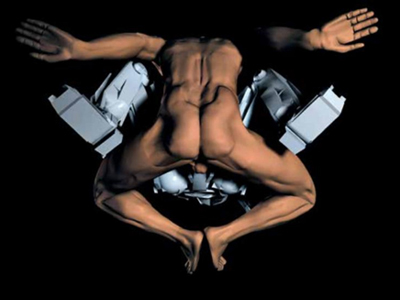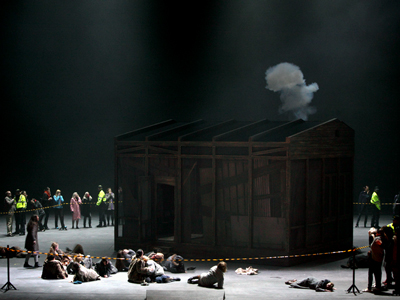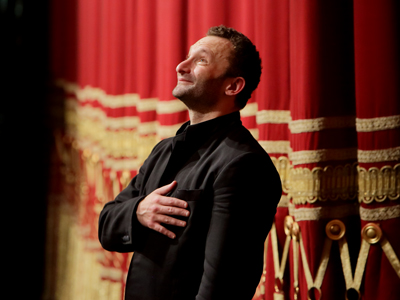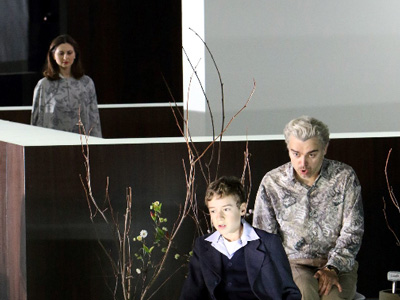
By ANDREW POWELL
Published: June 28, 2013
MUNICH — It helps when two of Caruso’s “four greatest singers” live nearby, the more so when they act as capably as they sing. That was the edge enjoyed by Bavarian State Opera in restaging Verdi’s Il trovatore to open its 138-year-old Munich Opera Festival yesterday, one of no fewer than 17 operas by Verdi and Wagner to be given here in the next 35 days. But leave it to Nikolaus Bachler — gifted narrator, sometime actor, and guiding light at this, Germany’s richest and busiest opera company — to OK a staging scheme that substitutes Age of Steam vaudeville and farce for 15th-century Aragón and Vascongadas melodrama, black-on-black sets and glaring white-neon slashes for Latin color, rootless stand-ins for impassioned characters.
French régisseur Olivier Py “focuses on the darkness, nightmare and horror of the story,” making use of a rotating four-level unit set, with add-ons and modular subtractions as events unfold. Engaging for a while, the unit unavoidably out-twirls its welcome and by Parts III and IV, bereft of sufficient new dramaturgical thought, it is largely shunted aside. Sooner than that, however, Py’s translocation trivializes the tale. Ferrando’s story-setting — the sleeping babies, the gypsy hag and all — plays on a vaudeville stage-within-the-stage to men in suits and ties. After an Anvil Chorus sparked by hammerings on a steam locomotive, all depart, leaving Azucena to wail her own backgrounder (Stride la vampa!) with no audience. Leonora’s rescue from a convent future misfires as a result of action split onto two non-competing levels, and Manrico’s execution confounds all situational logic. Ah well, at least there is Azucena’s nude mom-ghost as constant company.
Those locals, Anja Harteros* and Jonas Kaufmann, made their scenic role debuts amid this nonsense. It was her night, not so much the troubadour’s, but both sang with consistent beauty of tone and expressive point. Aided by conductor Paolo Carignani, the Greek-German soprano delivered a luxuriant, pleasingly inflected Tacea la notte placida and later fairly milked D’amor sull’ali rosee, bringing down the house. Then Carignani, otherwise robust of purpose, failed to inject tension for the Miserere and Leonora’s ensuing stretta fell flat. Kaufmann traversed his seventh Verdi role with power to spare. Ah sì, ben mio, sung against a reflecting board, drew best use of his bronzed timbre and deft messa di voce. On the phrase O teco almeno he mustered (to these ears**) a high B‑flat and held it without strain for four seconds. He refused to push for volume in the All’armi! — a smart Manrico, no mad thriller.
Caruso’s quartet found completion in relative veterans Elena Manistina and Alexey Markov, an Azucena and Conte di Luna pairing at the Met this past January. She unquestionably has the chops for the gypsy — contralto with an extended top, more than mezzo-soprano as marketed — but she did not yesterday convey terror, horror or motherhood. After an impeccable Il balen del suo sorriso, Markov’s unified, rich baritone seemed to fade. He came nowhere near to matching Harteros in the sexually charged sequence Mira, di acerbe lagrime … Vivrà! contende il giubilo, the evening’s one serious musical setback. Years of Bayreuth duty have sadly lodged a beat in Kwangchul Youn’s warm and solidly trained bass. Still, as Ferrando on that vaudeville stage, he gamely and vividly introduced the story (Di due figli vivea padre beato) to Py’s implausible audience.
Carignani lifted Verdi’s lines and mostly kept the rhythms alive and taut. He favored light textures, kindly supporting the voices but depriving the string sound of bottom and resonance. The Bavarian State Orchestra played well for him; the chorus sang in unclear Italian with fair discipline. During intermission, Manistina and Kaufmann silently indulged the director in an onstage magic-trick box-sawing of the tenor’s body. Fortuitously, maybe, this passed with little notice, as the well-dressed premiere throngs were still out sipping wine, munching canapés and spooning Rote Grütze mit Vanillesoße.
[*Munich is artistic home for the soprano. She lives in Bergneustadt.]
[**For Associated Press, Mike Silverman reports a B-natural in his interview-cum-review. Annika Täuschel, reporting for BR Klassik, claims Kaufmann actually sang a high C yesterday: “Er singt es, das hohe C!”]
Still image from video © Bayerische Staatsoper
Related posts:
Safety First at Bayreuth
Manon, Let’s Go
Boccanegra via Tcherniakov
Time for Schwetzingen
Busy Week





Six Husbands in Tow
Sunday, March 13th, 2016By ANDREW POWELL
Published: March 13, 2016
MUNICH — Some contracts come with strings attached, others with husbands. In a remarkable set of coincident artistic priorities for company boss Nikolaus Bachler — or a broad capitulation — Bavarian State Opera’s 2016–17 season, announced today, features no fewer than six divas in performance with their husbands. Edita Gruberová, Elīna Garanča and Kristine Opolais will star in Roberto Devereux, La Favorite and Rusalka while their other halves conduct. Diana Damrau, Anna Netrebko and Aleksandra Kurzak will headline Lucia di Lammermoor, Macbeth and La Juive while alongside them their spouses sing. In another family tie, Vladimir Jurowski has apparently been allowed to abandon the new Ognenny angel he led (electrically) this season in favor of … his dad. Small wonder 2016–17 is dubbed “Was folgt”: What follows.
Photos © Wiener Staatsoper (Elīna Garanča), Opernhaus Zürich (Anna Netrebko), Bill Cooper for the Royal Opera House (Kristine Opolais), Catherine Ashmore for the ROH (Aleksandra Kurzak, Diana Damrau), Wilfried Hösl (Edita Gruberová)
Related posts:
Kaufmann, Wife Separate
Antonini Works Alcina’s Magic
Manon, Let’s Go
Poulenc Heirs v. Staatsoper
Concert Hall Design Chosen
Tags:Aleksandra Kurzak, Bavarian State Opera, Bayerische Staatsoper, Commentary, Diana Damrau, Edita Gruberová, Garanča, Kristine Opolais, La Juive, Lucia di Lammermoor, Macbeth, München, Munich, Netrebko, News, Nikolaus Bachler, Ognenny angel, Roberto Devereux, Vladimir Jurowski
Posted in Munich Times | Comments Closed